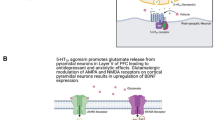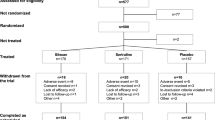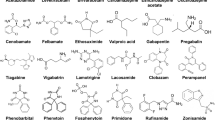Abstract
Neurocognitive impairment is a core feature in the pathology of schizophrenia and considered to be relatively persistent towards psychopharmacological interventions. There are hints that atypical antipsychotics can influence neurocognitive dysfunctions more favorable than conventional compounds. But little is known about differences in efficacy on neurocognitive dysfunctions linked to the variety of receptor profiles of different atypical antipsychotics. This study compared the effects of the atypical antipsychotics quetiapine and olanzapine on cognitive function in patients with an acute episode of schizophrenia. Patients were randomized to receive quetiapine or olanzapine for 8 weeks. Cognitive function was assessed at baseline, week 4 and week 8. Efficacy was assessed weekly using the Positive and Negative Syndrome Scale (PANSS) and the Clinical Global Improvement Scale (CGI). Tolerability was assessed each week using the Extrapyramidal Symptom Rating Scale (ESRS), the Barnes Akathisia Scale (BAS) and the Udvalg for Kliniske Undersogelser Side Effect Rating Scale (UKU). In total, 52 patients were enrolled in the study. Data from the 33 patients who completed cognitive assessments at two or more time points out of three (baseline, Week 4 and Week 8) are analyzed here. Both quetiapine and olanzapine improved global cognitive index z-scores, however, this was more marked with quetiapine. Between-group comparisons showed significantly greater improvements in reaction quality/attention with quetiapine than olanzapine. Quetiapine and olanzapine produced significant improvements from baseline to week 8 in PANSS total and subscale scores. Both treatments were well tolerated, especially no EPS occurred during 8 weeks of treatment. Both quetiapine and olanzapine improved cognition; however, the improvement in cognitive index scores was more marked in patients receiving quetiapine. Furthermore, quetiapine produced a significantly greater improvement in reaction quality/attention than olanzapine.



Similar content being viewed by others
References
Arnsten AF (2004) Adrenergic targets for the treatment of cognitive deficits in schizophrenia. Psychopharmacology (Berl) 174:25–31
Arnsten AF, Cai JX (1993) Postsynaptic alpha-2 receptor stimulation improves memory in aged monkeys: indirect effects of yohimbine versus direct effects of clonidine. Neurobiol Aging 14:597–603
Berman I, Viegner B, Merson A, Allan E, Pappas D, Green AI (1997) Differential relationships between positive and negative symptoms and neuropsychological deficits in schizophrenia. Schizophr Res 25:1–10
Bilder RM, Goldman RS, Volavka J, Czobor P, Hoptman M, Sheitman B, Lindenmayer JP, Citrome L, McEvoy J, Kunz M, Chakos M, Cooper TB, Horowitz TL, Lieberman JA (2002) Neurocognitive effects of clozapine, olanzapine, risperidone, and haloperidol in patients with chronic schizophrenia or schizoaffective disorder. Am J Psychiatry 159:1018–1028
Birnbaum S, Gobeske KT, Auerbach J, Taylor JR, Arnsten AF (1999) A role for norepinephrine in stress-induced cognitive deficits: alpha-1-adrenoceptor mediation in the prefrontal cortex. Biol Psychiatry 46:1266–1274
Bleuler E (1950) In: Zinkin J (ed) Dementia praecox for the group of schizophrenias. International University Press, New York
Bourson A, Boess FG, Bos M, Sleight AJ (1998) Involvement of 5-HT6 receptors in nigro-striatal function in rodents. Br J Pharmacol 125:1562–1566
Cuesta MJ, Peralta V, Zarzuela A (2001) Effects of olanzapine and other antipsychotics on cognitive function in chronic schizophrenia: a longitudinal study. Schizophr Res 48:17–28
Friedman JI, Temporini H, Davis KL (1999) Pharmacologic strategies for augmenting cognitive performance in schizophrenia. Biol Psychiatry 45:1–16
Ghoneim MM, Mewaldt SP (1977) Studies on human memory: the interactions of diazepam, scopolamine, and physostigmine. Psychopharmacology (Berl) 52:1–6
Gold JM, Carpenter C, Randolph C, Goldberg TE, Weinberger DR (1997) Auditory working memory and Wisconsin Card Sorting Test performance in schizophrenia. Arch Gen Psychiatry 54:159–165
Goldberg TE, Greenberg RD, Griffin SJ, Gold JM, Kleinman JE, Pickar D, Schulz SC, Weinberger DR (1993) The effect of clozapine on cognition and psychiatric symptoms in patients with schizophrenia. Br J Psychiatry 162:43–48
Good KP, Kiss I, Buiteman C, Woodley H, Rui Q, Whitehorn D, Kopala L (2002) Improvement in cognitive functioning in patients with first-episode psychosis during treatment with quetiapine: an interim analysis. Br J Psychiatry Suppl 43:45–49
Green MF, Marder SR, Glynn SM, McGurk SR, Wirshing WC, Wirshing DA, Liberman RP, Mintz J (2002) The neurocognitive effects of low-dose haloperidol: a two-year comparison with risperidone. Biol Psychiatry 51:972–978
Green MF, Nuechterlein KH, Gold JM, Barch DM, Cohen J, Essock S, Fenton WS, Frese F, Goldberg TE, Heaton RK, Keefe RS, Kern RS, Kraemer H, Stover E, Weinberger DR, Zalcman S, Marder SR (2004) Approaching a consensus cognitive battery for clinical trials in schizophrenia: the NIMH-MATRICS conference to select cognitive domains and test criteria. Biol Psychiatry 56:301–307
Gutbrod K, Cohen R, Mager B, Meier E (1989) Coding and recall of categorized material in aphasics. J Clin Exp Neuropsychol 11:821–841
Hawkins KA (1999) Memory deficits in patients with schizophrenia: preliminary data from the Wechsler memory scale-third edition support earlier findings. J Psychiatry Neurosci 24:341–347
Hawkins KA, Hoffman RE, Quinlan DM, Rakfeldt J, Docherty NM, Sledge WH (1997) Cognition, negative symptoms, and diagnosis: a comparison of schizophrenic, bipolar, and control samples. J Neuropsychiatry Clin Neurosci 9:81–89
Heaton R, Paulsen JS, McAdams LA, Kuck J, Zisook S, Braff D, Harris J, Jeste DV (1994) Neuropsychological deficits in schizophrenics. Relationship to age, chronicity, and dementia. Arch Gen Psychiatry 51:469–476
Heaton RK, Gladsjo JA, Palmer BW, Kuck J, Marcotte TD, Jeste DV (2001) Stability and course of neuropsychological deficits in schizophrenia. Arch Gen Psychiatry 58:24–32
Hertel P, Fagerquist MV, Svensson TH (1999) Enhanced cortical dopamine output and antipsychotic-like effects of raclopride by alpha2 adrenoceptor blockade. Science 286:105–107
Hoff AL, Sakuma M, Wieneke M, Horon R, Kushner M, DeLisi LE (1999) Longitudinal neuropsychological follow-up study of patients with first-episode schizophrenia. Am J Psychiatry 156:1336–1341
Hughes C, Kumari V, Soni W, Das M, Binneman B, Drozd S, O’Neil S, Mathew V, Sharma T (2003) Longitudinal study of symptoms and cognitive function in chronic schizophrenia. Schizophr Res 59:137–146
Kane JM, Carson WH, Saha AR, McQuade RD, Ingenito GG, Zimbroff DL, Ali MW (2002) Efficacy and safety of aripiprazole and haloperidol versus placebo in patients with schizophrenia and schizoaffective disorder. J Clin Psychiatry 63:763–771
Kapur S, Seeman P (2001) Does fast dissociation from the dopamine d(2) receptor explain the action of atypical antipsychotics?: a new hypothesis. Am J Psychiatry 158:360–369
Keefe RS, Roitman SE, Harvey PD, Blum CS, DuPre RL, Prieto DM, Davidson M, Davis KL (1995) A pen-and-paper human analogue of a monkey prefrontal cortex activation task: spatial working memory in patients with schizophrenia. Schizophr Res 17:25–33
Keefe RS, Seidman LJ, Christensen BK, Hamer RM, Sharma T, Sitskoorn MM, Lewine RR, Yurgelun-Todd DA, Gur RC, Tohen M, Tollefson GD, Sanger TM, Lieberman JA (2004) Comparative effect of atypical and conventional antipsychotic drugs on neurocognition in first-episode psychosis: a randomized, double-blind trial of olanzapine versus low doses of haloperidol. Am J Psychiatry 161:985–995
Keefe RS, Silva SG, Perkins DO, Lieberman JA (1999) The effects of atypical antipsychotic drugs on neurocognitive impairment in schizophrenia: a review and meta-analysis. Schizophr Bull 25:201–222
Kraepelin E (1919) Dementia Praecox and Paraphrenia. (Translated by Barclay RM, Robertson GM) Lifingstone, Edinborugh
Lehrl S (1977) Mehrfachwahl-Wortschatz-Intelligenztest. Manual zum MWT-B. Straube, Erlangen
Lewis R (2004) Should cognitive deficit be a diagnostic criterion for schizophrenia? J Psychiatry Neurosci 29:102–113
McKeage K, Plosker GL (2004) Amisulpride: a review of its use in the management of schizophrenia. CNS Drugs 18:933–956
Meltzer HY (2004) Cognitive factors in schizophrenia: causes, impact, and treatment. CNS Spectr 9:15–24
Meltzer HY, Li Z, Kaneda Y, Ichikawa J (2003) Serotonin receptors: their key role in drugs to treat schizophrenia. Prog Neuropsychopharmacol Biol Psychiatry 27:1159–1172
Meltzer HY, McGurk SR (1999) The effects of clozapine, risperidone, and olanzapine on cognitive function in schizophrenia. Schizophr Bull 25:233–255
Mewaldt SP, Ghoneim MM (1979) The effects and interactions of scopolamine, physostigmine and methamphetamine on human memory. Pharmacol Biochem Behav 10:205–210
Mishara AL, Goldberg TE (2004) A meta-analysis and critical review of the effects of conventional neuroleptic treatment on cognition in schizophrenia: opening a closed book. Biol Psychiatry 55:1013–1022
Moeller HJ (2003) Amisulpride: limbic specificity and the mechanism of antipsychotic atypicality. Prog Neuropsychopharmacol Biol Psychiatr 27:1101–1111
Peuskens J, Demily C, Thibaut F (2005) Treatment of cognitive dysfunction in schizophrenia. Clin Ther 27(Suppl A):25–37
Purdon SE, Jones BD, Stip E, Labelle A, Addington D, David SR, Breier A, Tollefson GD (2000) Neuropsychological change in early phase schizophrenia during 12 months of treatment with olanzapine, risperidone, or haloperidol. The Canadian Collaborative Group for research in schizophrenia. Arch Gen Psychiatry 57:249–258
Purdon SE, Malla A, Labelle A, Lit W (2001) Neuropsychological change in patients with schizophrenia after treatment with quetiapine or haloperidol. J Psychiatry Neurosci 26:137–149
Reitan RM (1958) Validity of the trailmaking test as an indication of organic brain damage. Percept Mot Skills 8:271–276
Rey A (1958) L´examen clinique en psychologie. Presse Universitaire de France, Paris
Riedel M, Spellmann I, Strassnig M, Douhet A, Dehning S, Opgen-Rhein M, Valdevit R, Engel RR, Kleindienst N, Muller N, Moller HJ (2007) Effects of risperidone and quetiapine on cognition in patients with schizophrenia and predominantly negative symptoms. Eur Arch Psychiatry Clin Neurosci, in press
Riemer C, Borroni E, Levet-Trafit B, Martin JR, Poli S, Porter RH, Bos M (2003) Influence of the 5-HT6 receptor on acetylcholine release in the cortex: pharmacological characterization of 4-(2-bromo-6-pyrrolidin-1-ylpyridine-4-sulfonyl)phenylamine, a potent and selective 5-HT6 receptor antagonist. J Med Chem 46:1273–1276
Sacchetti E, Valsecchi P, Regini C, Galluzzo A, Cacciani P, Agrimi E, Mencacci C (2004) Comparison of quetiapine (Seroquel), olanzapine and risperidone in a randomised study in patients with schizophrenia
Shayegan DK, Stahl SM (2004) Atypical antipsychotics: matching receptor profile to individual patient’s clinical profile. CNS Spectr 9:6–14
Smith RC, Infante M, Singh A, Khandat A (2001) The effects of olanzapine on neurocognitive functioning in medication-refractory schizophrenia. Int J Neuropsychopharmacol 4:239–250
Spreen O, Benton AL (1965) Comparative studies of some psychological tests for cerebral damage. J Nerv Ment Dis 140:323–333
Tune LE, Strauss ME, Lew MF, Breitlinger E, Coyle JT (1982) Serum levels of anticholinergic drugs and impaired recent memory in chronic schizophrenic patients. Am J Psychiatry 139:1460–1462
Tyson PJ, Roberts KH, Mortimer AM (2004) Are the cognitive effects of atypical antipsychotics influenced by their affinity to 5HT-2A receptors? Int J Neurosci 114:593–611
Velligan DI, Bow-Thomas CC, Mahurin RK, Miller AL, Halgunseth LC (2000) Do specific neurocognitive deficits predict specific domains of community function in schizophrenia? J Nerv Ment Dis 188:518–524
Velligan DI, Newcomer J, Pultz J, Csernansky J, Hoff AL, Mahurin R, Miller AL (2002) Does cognitive function improve with quetiapine in comparison to haloperidol? Schizophr Res 53:239–248
Velligan DI, Prihoda TJ, Sui D, Ritch JL, Maples N, Miller AL (2003) The effectiveness of quetiapine versus conventional antipsychotics in improving cognitive and functional outcomes in standard treatment settings. J Clin Psychiatry 64:524–531
Vitiello B, Martin A, Hill J, Mack C, Molchan S, Martinez R, Murphy DL, Sunderland T (1997) Cognitive and behavioral effects of cholinergic, dopaminergic, and serotonergic blockade in humans. Neuropsychopharmacology 16:15–24
Voruganti LN, Heslegrave RJ, Awad AG (1997) Neurocognitive correlates of positive and negative syndromes in schizophrenia. Can J Psychiatry 42:1066–1071
Wagner M, Quednow BB, Westheide J, Schlaepfer TE, Maier W, Kuhn KU (2005) Cognitive improvement in schizophrenic patients does not require a serotonergic mechanism: randomized controlled trial of olanzapine vs amisulpride. Neuropsychopharmacology 30:381–390
Walker E, Harvey P (1986) Positive and negative symptoms in schizophrenia: attentional performance correlates. Psychopathology 19:294–302
Wiebel B, Happe A, Peikara F (1995) Das neuropsychologische Diagnostikprogramm TESTBAT. PSYMED, Dulmen
Author information
Authors and Affiliations
Corresponding author
Rights and permissions
About this article
Cite this article
Riedel, M., Müller, N., Spellmann, I. et al. Efficacy of olanzapine versus quetiapine on cognitive dysfunctions in patients with an acute episode of schizophrenia. Eur Arch Psychiatry Clin Neurosc 257, 402–412 (2007). https://doi.org/10.1007/s00406-007-0748-9
Received:
Accepted:
Published:
Issue Date:
DOI: https://doi.org/10.1007/s00406-007-0748-9




